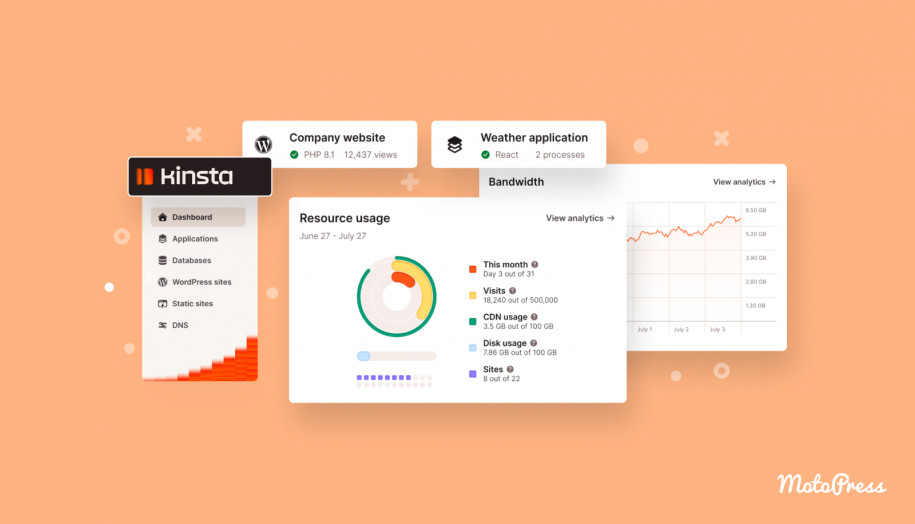WordPress Hosting Providers Review (2023)
Table of Contents
There are so many reviews and WordPress hosting comparison articles, so one more could seem redundant. But there are still points able to make this post useful, too: it is up-to-date, up to the point, and clearly systematized. Especially newbies can find here some essential tips for choosing the best hosting service for WordPress.
Let’s start with some well-known wisdom of choosing WordPress hosts. There are WordPress hosting providers that we can simply call giants (like BlueHost, SiteGround, etc.) – widely recognized and used names.
Mostly all of them are reliable, but the prices, bandwidth, and overall offerings can be different, so it would be great to check the advantages of each in particular.
You can find tons of mixed (starting with absolute charm with the services to absolute disappointment) independent WordPress hosting reviews written by the actual customers. This only means that each client’s experience is a case of particular circumstances, so it’s hard to say which one is the only criteria (obviously, none).
Moreover, all hosting providers can work a bit differently for various CMS’s, page builders, etc. Always be sure to check the hosting system requirements of the particular company (if you use a CMS like WordPress to build a site) you are going to work with. All in all, you may better pay attention to the number of positive reviews and negative ones, understanding the main tendency and value of them.
NB. Please keep in mind the difference between web hosting services and domain registration. To get to know the basics as well as nuances of choosing the best domain hosting option for your website, read our quick beginner’s guide.
Types of hosting
You can choose any depending on your needs and budget. All popular hosting companies usually offer different types of hosting (you can find all of the available ones directly under the Hosting menu on the official websites). So, the main ones are as follows:
Free: usually comes with very limited services, but can be the best web hosting for blogs, online diaries, or similar non-critical websites. The main minuses are a slow connection speed, frequent downtimes, and automatically added annoying advertising banners (Yola).
Shared: the most economical option for hosting, as the overall cost of server maintenance is amortized over many customers. The main downside is low speed. You’ll share the hosting environment with many websites on the Internet (SiteGround, BlueHost, HostGator).
Dedicated: typically, you won’t own the server with dedicated hosting but will get full control over the server and responsibility for the security and maintenance. Usually, this kind of server comes with better performance, security, and email stability. Most general, as well as WordPress dedicated hosting servers, are packaged with the control panel. You can go for dedicated WordPress hosting if your website requires a lot of system resources, or needs a higher level of security (SiteGround, GoDaddy, BlueHost).
Managed: it’s considered the most flexible kind of hosting allowing you to manage website data via any remote tool (generally, FTP server with your website files). The provider can guarantee service quality and support. The server is typically leased to the client. It provides great storage facilities for the server (e.g. HostGator, GoDaddy).
Colocated: the most reliable and powerful type of hosting server. Owing to this type of server (literally, hardware and software are at your disposal), you have full control over it and can install any apps or script you need to stay the only responsible person for the server (e.g. Rackspace, Interoute). However, colocation providers can be hard to find.
Cloud: this is a reliable decentralized kind of hosting, which is based on the clustered server. One big plus is that this hosting also allows providers to charge users only for resources consumed. Privacy concerns sometimes may arise because of the decentralized hosting model (e.g. SiteGround, GoDaddy, BlueHost).
The rankings of the WordPress hosting providers are usually based on:
- Price and storage provided for this price
- Reliability and affordability
- Uptimes and server speed
- Bandwidth (high bandwidth better deals with a lot of traffic)
- Ease of use and support
- Security and backups
Linux or Windows hosting package
One more essential point when choosing to host is the operating system (OS) of the webserver. If you are using the services of any custom CMS, you may find it out with the company provider asking to specify this requirement.
Linux
Linux is the most common hosting platform in the world. It’s more popular for all types of websites as it’s up-to-date with all the most common programming languages and applications. It is an industry-standard hosting platform.
Windows
Windows is powered by Microsoft. It supports Windows applications, databases, and programming frameworks like ASP.NET. Apart from Microsoft tools, you still have the freedom to utilize popular programming languages like PHP and MySQL.
Please note: there is no need to use Linux hosting for your work, or Windows to use Windows hosting.
Reviews
We’ve included one of the most reliable and experienced WordPress hosting providers with different characteristics without giving you an exact answer which one to choose right away and which one is actually the best WordPress hosting provider ever. Simply pay attention to the facts and your own requirements.
Kinsta, a fully-managed hosting powered by Google Cloud Platform, guarantees an impressive 99.9% uptime. The provider employs Nginx, PHP 7, LXD containers and MariaDB to ensure high speed of website loading. Among security measures for keeping hosted websites protected are continuous uptime monitoring, detection of DDoS attacks, hardware firewalls, SSL support and software restrictions. Kinsta offers 18 locations of global data centers for you to have your servers placed as close to as possible to the actual users and is ready for traffic surges on your site. Other highly beneficial features are:
- full daily backups
- staging areas and one-click pushing of staging sites to live
- free website migrations
- multifunctional and easy-to-use MyKinsta site managing platform
- 50 GB of free CDN for the basic Starter pricing plan
- four types of website caching
- 24/7 support
- free and top-priority fix of hacked websites
- PHP Versions: PHP 5.6, 7, 7.1, 7.2, 7.3
- 30-day money-back guarantee for all pricing plans
Cons:
- no multisite support for Starter pricing plan
- no site cloning option for Starter pricing plan
The popularity of this provider is growing faster and faster since 2003. The average uptime is 99,99% as of 2020, which is an excellent index. The average page loading time is around 585 ms. It’s hard to find negative feedback about their support representatives, whose workload can daily reach up to 2,000 chats, 1,500 tickets, and 800 calls. Their big plus in comparison with other competitors is managed WordPress hosting they propose on all accounts: security auto-updates, monthly back-ups, etc. You’ll be also provided with SuperCahcer and free CDN with 34 locations to improve the speed of loading huge multimedia files. More features include:
- hassle-free and quick account activation (cPanel)
- access to free security addons
- free domain name and money-back guarantee
- website hosting transfer free of charge
- one-click installs of eCommerce applications
- easy installs of other popular apps and CMSs via Softaculous
- officially recommended by WordpPress.org
Cons:
- comparatively limited storage space
- one-time setup charge for a monthly subscription
BlueHost now hosts over 2 million websites and is considered to be the best WordPress host in terms of comparatively low pricing for shared hosting options. It goes with 99,98% industry average uptime and 521 ms of page load speed. Here go the pros:
- spam protection with SpamAssassin, Spam Experts, and Spam Hammer
- hotlink protection (from stealing your website content and images)
- free domain names
- easy to manage control panel
- integration with a lot of apps, including Google apps and Cloudflare
- hassle-free apps installation from Mojo Marketplace
- officially recommended by WordpPress.org
- contains many Youtube tutorials
Cons:
- waiting time in the chat is up to 40 minutes because of an enormous clientele
- moving to another hosting provider will cost you $149.99
JustHost is one more reliable hosting provider, with which average uptime can fall to 99.64%. The average speed is also in between 913 ms and 1,429 ms, which is good, but not excellent. Time to proceed with the good sides of this provider:
- 30-day money-back guarantee
- quick 2-step signup process
- integration with all popular open-source applications (approximately 100 apps) including Google
- free domain name
- many one-click install for popular apps and CMSs
Cons:
- comparatively low page load time
- their own custom cPanel instead of standard cPanel (not a big issue for many users)
WordPress hosting has a reputation as a very credible and high-quality WP host, it is so not without a reason. WordPress is one of the biggest CMS nowadays that powers more than 34% of all websites on the Internet and stands along with all WordPress recommended hosts. Half of all WP websites are powered by wordpress.com hosting (that is 37,500,000 websites). Hence, the name itself raises the confidence and level of trust. This is one of the best hosts for WordPress since it gives you useful features:
- create unlimited pages and blog posts for your website
- a custom wordpress.com address
- hundreds of free themes to choose from
- customer support via emails and chats
- easy sign-up process
- free storage space (vary depending on the plan)
- site monetization
Cons:
- ads in the free plan
- no access to FTP
Note: this WordPress web hosting can not be used with free themes from wp.org. As soon as you get one of the WordPress hosting plans, you can start with choosing themes available there. Using this provider will be one universal solution for launching a website with domain, design, plugins, installation gathered in one place for you.
Conclusions and tips for choosing the best WordPress hosting for WordPress self-hosted sites
- If you are using the services of any CMS like WordPress, find out about their system requirements before choosing the hosting.
- Ask the hosting provider whether they suit your kind of business (usually they are always pretty clear and honest about it).
- Pay main attention to the bandwidth if you expect big traffic.
- Don’t be afraid to proceed with a cheaper hosting provider if there are no critical issues with it.
- Try to test the hosting provider by yourself as your experience can really differ from all earlier read reviews.
- MotoPress team also has tested top WordPress hosting providers and can recommend four of them.
Is there any important matter we did not cover in this small review? Or perhaps there is a company or service you consider the best web hosting for WordPress?
Share your thoughts with us!
Disclosure: this article may contain affiliate links for third-party products. If you click a link and later make a purchase, we may earn an affiliate commission that doesn’t result in additional charges to you.




Thanks for the suggestions. I contacted SiteGround support to ask about hosting options. They answered the phone almost immediately! Very reassuring conversation. May be moving some of my clients’ sites over to their system. I’ve been using InMotion Hosting as well, and have been satisfied with them as well.
Thank you for your feedback, we are sure that it’ll be useful for our readers.